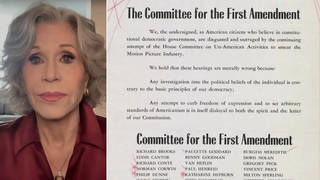
As we speak with Professor Kellie Carter Jackson, who teaches Africana studies at Wellesley College and joined a teach-in in Florida over the weekend, we ask about the new Netflix documentary series African Queens: Njinga, which she is featured in and tells the story of the 17th century warrior queen who fought the Portuguese slave traders. The series is executive produced and narrated by Jada Pinkett Smith. Jackson calls it a “major contribution to understanding slavery and the slave trade” and notes it is “readily available” online “if students cannot get this in Florida in their classroom.”
More from this Interview
Transcript
AMY GOODMAN: Professor Kellie Carter Jackson, you teach Africana studies at Wellesley College. You’re featured in the new Netflix documentary series called African Queens: Njinga, executive produced and narrated by Jada Pinkett Smith. This is the trailer.
JADA PINKETT SMITH: Born into an era of darkness, a warrior, a queen, destined to lead.
NJINGA: [played by Adesuwa Oni] There are no slaves in my kingdom.
JADA PINKETT SMITH: She fearlessly defended her kingdom against European power.
KILUANJE: [played by Siya Sikawuti]The king’s under threat!
MBANDE: [played by Philips Nortey] The king is always under threat.
JADA PINKETT SMITH: Slavery threatened to decimate a continent.
NJINGA: We are people born running from extinction.
JADA PINKETT SMITH: Rising to become a beacon of light for her people.
NJINGA: I have nothing to lose, which makes me dangerous.
NGANGA: [played by Zethu Dlomo-Mphahlele] What do you want?
NJINGA: The kind of power that will make a difference in my people’s lives.
Let’s leave these new foreigners in no doubt who I am
KELLIE CARTER JACKSON: Such a power move and such a boss move.
EDSON BURTON: Njinga was a mother of a nation, but she loved her country. And for that, she made great sacrifices.
LUKE PEPERA: Njinga was the only African leader to be recognized by European rulers in power as a female king.
KELLIE CARTER JACKSON: I think of her as probably one of the greatest women warriors and women leaders this world has ever seen.
ROSA CRUZ E SILVA: One hundred percent.
NGANGA: All hail Queen Njinga!
CROWD: Njinga! Njinga! Njinga! Njinga! Njinga!
AMY GOODMAN: The trailer for the Netflix documentary series African Queens: Njinga, executive produced and narrated by Jada Pinkett Smith. I spent last night watching this series, basically watching you, Professor Kellie Carter Jackson. It’s an epic series, taking on everyone from Portugal to the Catholic Church. Talk about its significance —
KELLIE CARTER JACKSON: Yeah.
AMY GOODMAN: — and the concern that maybe children in this country would not be allowed to see it.
KELLIE CARTER JACKSON: Oh man. First of all, I was so honored to be a part of that documentary. It really is wonderful. And I think it introduces Queen Njinga to the world. I think not a lot of people are familiar with African history, let alone specific kingdoms and rulers. And to know that Queen Njinga was a warrior king, that she was fighting off the Portuguese, that she was trying to protect her people from the institution of slavery, that she was doing this as a young woman, but even until her sixties and seventies she’s riding out onto horseback, you know, like, fighting against the Portuguese, it is an epic story of her life and such a major contribution to understanding slavery and the slave trade and the Atlantic world.
I realize that, you know, if students can’t get this in Florida in their classrooms, that Netflix is something that’s readily available to a lot of people. And I hope that people will sit down and they will watch this and they will grapple with this history and they will want to learn more about African history, because it’s so important. It is not tangential. It’s not superficial. That you have real people that are making incredible contributions to how we think about our own freedom and our own identity. And Queen Njinga does that. And the fact that she’s a woman and a Black woman and so courageous, the story really is inspiring. It’s definitely violent. It’s definitely not for children, I would say. But, you know, if you have teenagers, if you have older children that you can really talk them through this, I think it’s a wonderful way of looking at this history and making sense of it.
AMY GOODMAN: Well, congratulations on this series.











Media Options